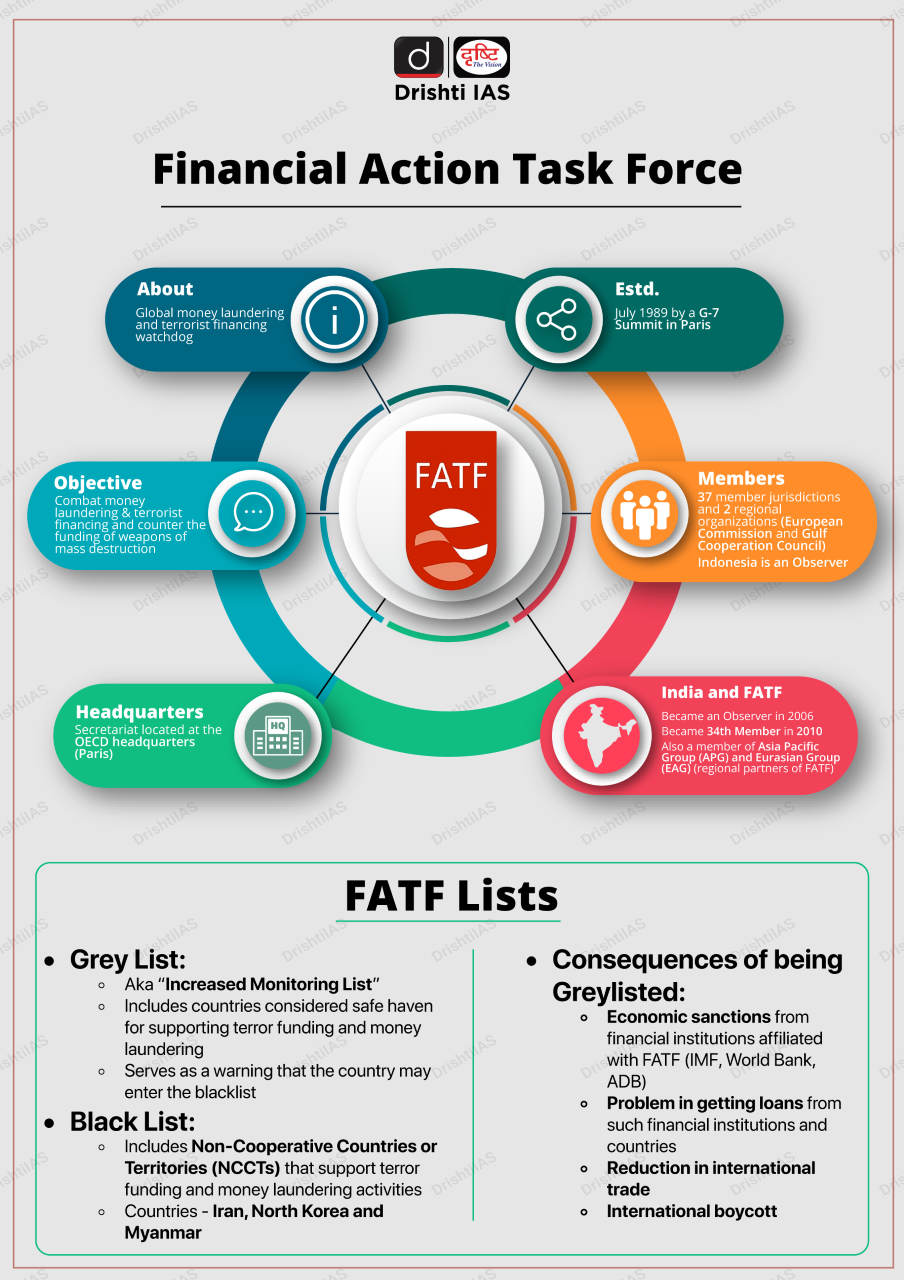Economy
FATF Mutual Evaluation Report on India
- 21 Sep 2024
- 8 min read
For Prelims: Financial Action Task Force, Gems and Jewellery Export Promotion Council, Jan Dhan-Aadhaar-Mobile (JAM) initiative, Goods and Services Tax, National Investigation Agency, Islamic State of Iraq and the Levant, Enforcement Directorate
For Mains: India’s Progress in Combating Illicit Finance, Money Laundering and Terror Financing
Why in News?
Recently, the Financial Action Task Force (FATF) released its Mutual Evaluation Report on India, highlighting the country's significant progress in combating illicit finance.
Note: The FATF plenary held in Singapore in June 2024 adopted the Mutual Evaluation Report for India, stating that it had achieved "high level of technical compliance" with the requirements of the global money laundering watchdog.
- The FATF had placed India in the "regular follow-up" category, the highest rating category by FATF becoming the only major economy with a federal structure to achieve this status.
- UK, France and Italy are among the only G-20 countries which have been placed in this category apart from India.
What are the Key Highlights of the FATF Mutual Evaluation Report on India?
- Areas Requiring Improvement: India was found partially compliant in three areas.
- Non-Profit Organisations (NPOs): NPOs registered as charitable organizations and enjoying tax exemptions could be vulnerable to terror funding.
- The system requires better measures to address risks associated with these organisations.
- Politically Exposed Persons (PEPs): Ambiguities exist regarding the source of wealth, source of funds, and beneficial ownership for domestic PEPs. The government needs to address these ambiguities.
- Designated Non-Financial Businesses and Professions (DNFBPs): Gaps exist in the regulation and supervision of DNFBPs, especially regarding money laundering and terror financing.
- DNFBPs contribute significantly to India's Gross Domestic Product (GDP), with precious metals and stones accounting for 7% and real estate 5%.
- Non-Profit Organisations (NPOs): NPOs registered as charitable organizations and enjoying tax exemptions could be vulnerable to terror funding.
- Money Laundering Risks: Illegal activities within India are the primary sources of money laundering risks, including fraud, cyber fraud, corruption, and drug trafficking.
- PMS Vulnerable to Money Laundering: Precious metals and stones (PMS) can be used to move large amounts of funds without leaving an ownership trail.
- The size of India’s PMS market contributes to its vulnerability to money laundering and terrorist financing. The sector includes approximately 1,75,000 dealers, but only 9,500 are registered with the Gems and Jewellery Export Promotion Council (GJEPC).
- The FATF report noted that criminal networks operating cross-border in the PMS sector may be under-investigated by law enforcement.
- Given India’s global role as a major consumer and producer of refined diamonds and gems, fraud and smuggling techniques need to be continuously monitored to prevent money laundering activities.
- There is a need for better risk understanding and deeper qualitative and quantitative data on the ML/TF risks associated with gold and diamond smuggling.
- Terrorist Financing Threats: India faces significant terrorism threats, particularly from Islamic State of Iraq and the Levant (ISIL) and Al-Qaeda-linked groups active in and around Jammu and Kashmir.
- Regional insurgencies in the Northeast and Left-Wing Extremist groups also pose terrorism risks.
- While the country emphasizes prevention and disruption of terrorist financing, more effort is required to conclude prosecutions and convict terrorist financiers.
- Financial Inclusion: India has significantly enhanced financial inclusion, with a sharp rise in bank account holders and the increased use of digital payment systems.
- Simplified due diligence for small accounts has supported financial transparency and contributed to AML/CFT efforts.
- Acknowledged the Jan Dhan-Aadhaar-Mobile (JAM) initiative for promoting digital payments.
- Appreciated the implementation of Goods and Services Tax (GST), e-invoices, and e-bills for increasing supply chain transparency.
- Action Against Terror Financing: Acknowledged effective action against terror financing by the National Investigation Agency (NIA) and the Enforcement Directorate.
- FATF’s Recommendations:
- Pending Trials: India needs to expedite the conclusion of pending money laundering trials and improve its handling of crimes like human trafficking and drug-related offences.
- Targeted financial sanctions: India must improve its framework to ensure the freezing of funds and assets without delay and streamline communication regarding sanctions.
- Domestic PEPs: India needs to define domestic PEPs under its anti-money laundering laws and implement risk-based enhanced measures for them.
What are the Implications of FATF’s Mutual Evaluation for India?
- International Collaboration and Asset Recovery: India’s recognition from FATF enhances its ability to cooperate with other nations in tracking and recovering illicit assets, including those related to fugitive offenders like Vijay Mallya and Nirav Modi.
- Improved collaboration with global financial watchdogs aids in counter-terror financing efforts.
- Improved Access to Global Financial Systems: FATF ratings improve India’s access to global financial markets, enabling easier borrowing and investments from international institutions.
- The recognition supports the global expansion of India’s Unified Payments Interface (UPI), making it a preferred choice for cross-border digital payments.
- Strengthening Investor Confidence: Positive evaluation enhances India’s credibility and boosts foreign investor confidence in financial markets, making India a more attractive destination for foreign direct investments (FDI).
Conclusion
The FATF Mutual Evaluation Report marks a significant milestone for India in its fight against illicit finance. The recognition as a leader in anti-money laundering and counter-terror financing sets a benchmark for other nations, while the need for continuous improvements in areas like NPOs and PEPs remains crucial. This evaluation positions India favourably for future economic growth and international collaboration.
Read more: FATF’s Mutual Evaluation Report on India
|
Drishti Mains Question: Discuss the significance of the FATF Mutual Evaluation Report for India's financial integrity and its implications on India. |
UPSC Civil Services Examination, Previous Year Questions (PYQs)
Q. Discuss how emerging technologies and globalisation contribute to money laundering. Elaborate measures to tackle the problem of money laundering both at national and international levels. (2021)






-min.jpg)